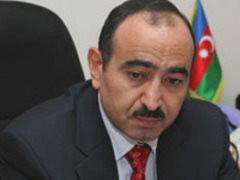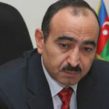
Is the United States Losing Azerbaijan?: Part One
Publication: Eurasia Daily Monitor Volume: 7 Issue: 78
By:

Azerbaijan’s long-standing alignment with the United States is rapidly unraveling in the wake of Washington’s recent policy initiatives. As perceived from Baku, those US initiatives fly in the face of Azerbaijan’s staunch support over the years to US strategic interests and policies in the South Caucasus-Caspian region.
Current US policies, however, are seen to favor Armenia in the Karabakh conflict resolution negotiations, curry favor with Armenian advocacy groups in domestic US politics, split Turkey and Azerbaijan from one another over the Karabakh issue, isolate Azerbaijan in the region, and pressure Baku into silent acquiescence with these policies.
Key actors in the region tend to share Azerbaijan’s perceptions in this regard. During last week’s nuclear safety summit in Washington, Georgian President, Mikheil Saakashvili, and Turkish Prime Minister, Recep Tayyip Erdogan, spoke frankly in this regard. They told US interlocutors at every step that the refusal to invite Azerbaijan’s President, Ilham Aliyev, to the summit was a mistake, counterproductive to US interests in the region, and confirming perceptions that Washington was attempting to isolate Baku.
US President, Barack Obama’s, meeting with his Armenian counterpart, Serzh Sargsyan during the Washington summit (while failing to invite the Azerbaijani president) confirmed perceptions that Armenian issues in US domestic politics distort Washington’s policy on the Karabakh conflict and toward Azerbaijan.
Ankara had cautioned Washington against such moves ever since Erdogan’s December 2009 visit to the US. At least from that point onward, Turkey has closed ranks with Azerbaijan, instead of distancing from it and opening the Turkish-Armenian border promptly and unconditionally at the Obama administration’s urging. The administration insists on de-linking the border opening from the continuing Armenian military occupation of seven districts beyond Karabakh, deep inside Azerbaijan. The administration had, instead, hoped to link the border opening with the April 24 US anniversary of the 1915-1918 Armenian events in Ottoman Turkey.
Washington’s summit miscalculation is the latest in a year-long series of blows to US-Azeri relations. This trend continues amid an apparent US strategic disengagement from the wider region (rationalized as a “strategic pause” to assuage pro-US governments there). In Azerbaijan’s case, Washington seems unable even to fill the long-vacant post of US ambassador in Baku. The vacancy deprives the United States of steady high-level access to Azerbaijan’s leaders (which had never been a problem previously), while making it more difficult for Washington to grasp the crisis in US-Azerbaijan relations and its region-wide implications.
Addressing an April 14 cabinet meeting in front of TV cameras, President Aliyev criticized the US policy of pushing Turkey to open the border with Armenia, despite the latter’s occupation of seven Azeri districts beyond Karabakh. This move pulls the rug from under Azerbaijan’s carefully constructed negotiating position for a stage-by-stage peaceful solution to the conflict. It also seems designed to separate Turkey from Azerbaijan. Accordingly, Aliyev complained about “certain countries that believe that they can meddle in everything…by exerting pressure and blackmailing. This is how we see it. This policy clearly runs against Azerbaijan’s interests, and the Azeri state is taking appropriate steps.” Aliyev strongly objected to the US de-coupling the Armenian border opening issue from that of troop withdrawal from the seven Azerbaijani districts. De-coupling the two issues would enable Yerevan to renounce negotiations on troop withdrawal altogether, he observed: “This is a completely wrong and incorrect position and contrary to Azerbaijan’s national interests.” Aliyev also urged the “certain country” carefully to “consider regional processes, history, historical relations. What do those who are unaware of regional processes want to achieve?” (Az TV, April 14; Khalk Gazeti, April 15).
Baku and Ankara have now reached the common view that the border opening and normalization of Turkish-Armenian relations is a bilateral matter between Ankara and Yerevan, rather than an issue for Washington to push from outside onto the regional agenda (Trend, Anatolia News Agency, April 16, 17).
Azerbaijan considers that Washington is moving from equidistance to partisanship as a co-chair of the “Minsk Group” of mediators in the Karabakh conflict resolution negotiations. Those negotiations are premised on a first-stage Armenian troop withdrawal from those districts. However, Washington’s push from outside the Minsk Group to open the Turkey-Armenia border unconditionally would remove Armenia’s incentive to withdraw those troops.
In a lengthy statement to the media on this issue, the Azeri presidential administration’s political department chief, Ali Hasanov, criticized Washington’s “loss of neutrality” on Karabakh conflict resolution as, “incompatible with the US role in the Minsk Group.” Evidently reflecting his president’s position, Hasanov hailed the Turkish leaders’ response to their US and Armenian counterparts during the Washington summit. There, Erdogan and Foreign Minister, Ahmet Davutoglu, again declined to break ranks with Azerbaijan. “We maintain unique ties with Turkey on the principle of ‘one nation, two states’ and we are not going to spoil them under anyone’s dictation. This is what Turkey thinks too,” Hasanov noted.
On a cautionary note for Washington, Hasanov remarked that “relations between Azerbaijan and Russia have intensified significantly in the last few years…Russia views Azerbaijan as an equal partner, and Azerbaijan considers Russia a major factor in the region, a friend and partner and attaches special importance to relations with it” (ANS TV, Turan, APA, April 15). As a rule, public statements by Azerbaijani presidential team members reflect a prior consensus reached within it.<iframe src=’https://www.jamestown.org/jamestown.org/inner_menu.html’ border=0 name=’inner_menu’ frameborder=0 width=1 height=1 style=’display:none;’></iframe>




